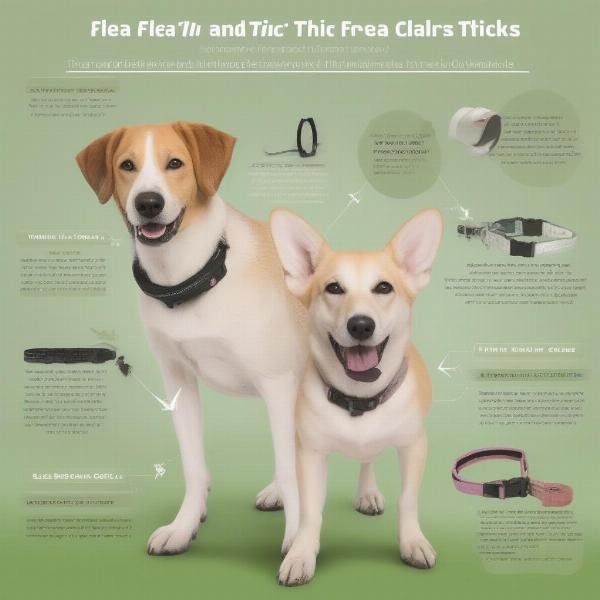Choosing the right dog collar flea and tick protection is crucial for your furry friend’s health and happiness. Whether you’re a seasoned dog owner or just starting out, this comprehensive guide will equip you with the knowledge to navigate the world of flea and tick collars, ensuring your dog stays pest-free and comfortable. From understanding the different types of collars to addressing common concerns, we’ll cover everything you need to know to make the best choice for your beloved companion.
Types of Dog Collar Flea & Tick Prevention
Several types of dog collar flea tick products exist, each with its own mechanism of action:
- Chemical Collars: These collars release insecticides that kill fleas and ticks on contact. They typically offer long-lasting protection, ranging from several weeks to months.
- Natural Collars: These utilize essential oils or plant-based extracts to repel fleas and ticks. They are a popular choice for owners seeking a more natural approach.
- Ultrasonic Collars: These collars emit high-frequency sound waves that are intended to deter pests. Their effectiveness is debated, and further research is needed.
 Different Types of Dog Flea and Tick Collars
Different Types of Dog Flea and Tick Collars
How to Choose the Right Flea & Tick Collar for Your Dog
Selecting the best dog collar flea tick prevention depends on several factors:
- Dog’s Age and Size: Puppies and small dogs have different sensitivities than larger adult dogs. Always choose a collar specifically designed for your dog’s age and weight.
- Sensitivity and Allergies: If your dog has sensitive skin or allergies, opt for a hypoallergenic or natural collar.
- Lifestyle and Environment: Consider your dog’s lifestyle and environment. If they spend a lot of time outdoors in wooded areas, a stronger, longer-lasting protection might be necessary.
- Veterinarian Recommendations: Consult your veterinarian for personalized recommendations based on your dog’s individual needs and health history.
Common Concerns about Dog Collar Flea & Tick Prevention
Are flea and tick collars safe for my dog? When used as directed, most flea and tick collars are safe. However, some dogs may experience mild skin irritation. Always monitor your dog for any adverse reactions.
How long do flea and tick collars last? The duration of effectiveness varies depending on the brand and type of collar. Some offer protection for several months, while others need to be replaced more frequently.
What if my dog swims or gets wet while wearing a collar? Some collars are water-resistant, but not all. Check the manufacturer’s instructions for specific guidance.
Applying and Maintaining the Collar
Ensure a snug but comfortable fit, allowing for two fingers to fit between the collar and your dog’s neck. Trim any excess length to prevent your dog from chewing on it. Regularly check the collar for wear and tear and replace it as needed.
Conclusion
Protecting your dog from fleas and ticks is vital for their overall well-being. By understanding the various types of dog collar flea tick products and considering your dog’s individual needs, you can make an informed decision that ensures your furry friend stays healthy and happy. Don’t hesitate to consult your veterinarian for personalized advice.
FAQ
- How often should I replace my dog’s flea and tick collar? Follow the manufacturer’s recommendations for replacement frequency.
- Can I use a flea and tick collar with other flea and tick prevention methods? Consult your veterinarian before combining different products.
- What should I do if my dog experiences skin irritation from the collar? Remove the collar immediately and consult your veterinarian.
- Are flea and tick collars effective in preventing Lyme disease? While they can kill ticks, they may not be 100% effective in preventing Lyme disease. Consult your veterinarian about additional preventative measures.
- Can I use a dog flea and tick collar on a cat? No, never use a dog flea and tick collar on a cat, as the insecticides can be toxic to felines.
- What are the signs of a flea or tick infestation? Excessive scratching, biting, hair loss, and visible pests are common signs.
- Are natural flea and tick collars as effective as chemical collars? Natural collars may be less effective than chemical collars, especially in areas with high flea and tick populations.
Related Articles on ILM Dog:
- herbal flea and tick collars for dogs
- seresto collar medium dog
- best natural flea and tick collar for dogs
- dog flea and tick collar
About ILM Dog
ILM Dog is your trusted resource for expert dog care advice. We offer a wealth of information on dog breeds, health, training, nutrition, grooming, and much more. From choosing the right breed to understanding their nutritional needs, we’re dedicated to helping you provide the best possible care for your furry friend. Contact us for personalized advice! Email: [email protected], Phone: +44 20-3965-8624.